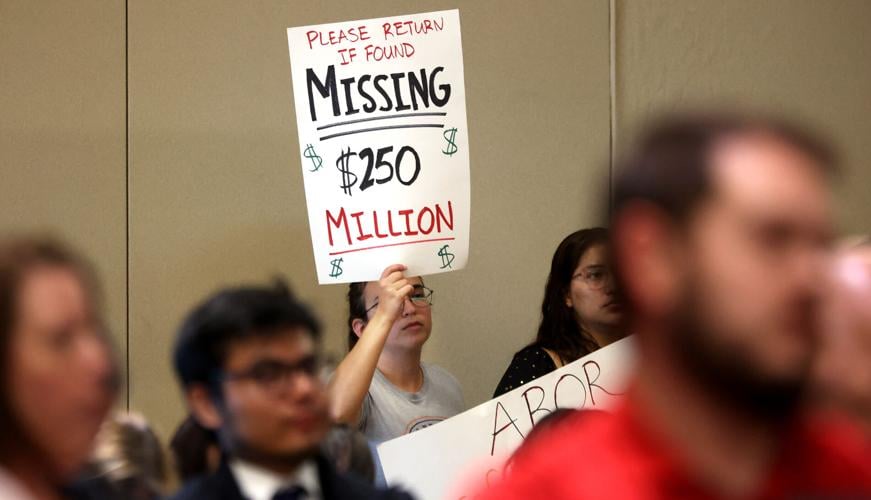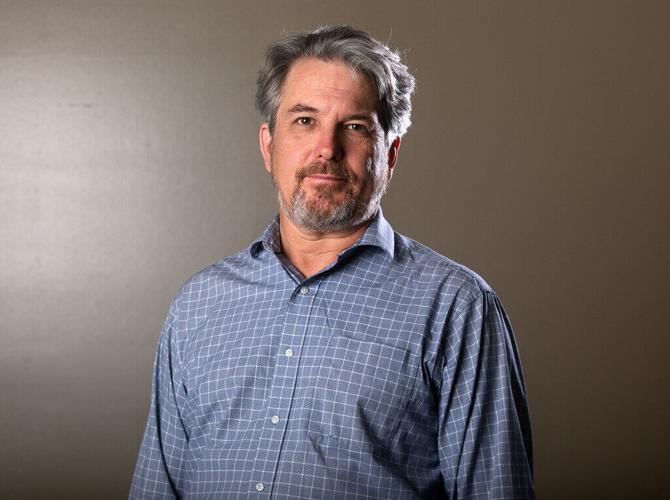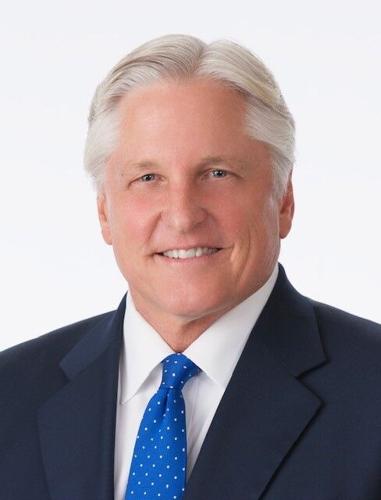Coming out of a crisis at the University of Arizona, Regent Fred DuVal took to this newspaper’s editorial pages and backed Pres. Robert Robbins.
“Bobby Robbins is on track to be one of the most successful and consequential presidents of UArizona in recent memory,” he wrote.
This was amid the last crisis, not the one we’re facing now. The op-ed came out in January, about three months after the foreseeable, on-campus killing of the chair of the Hydrology and Atmospheric Sciences Department, Prof. Tom Meixner.
So it shouldn’t come as a surprise that — with that crisis mostly handled and the university facing its next one — DuVal reappeared on the Star’s editorial page last week and pledged his support again.
“Higher education is being disrupted — like everything else — by technology, demographics, and politics,” wrote DuVal, now chair of the regents. “President Robbins enjoys the full support of the board as he makes the tough decisions this situation requires.”
The situation he referred to, of course, is the case of the disappearing cash-on-hand. The UA’s chief financial officer, Lisa Rulney, told the regents in June 2023 the university would have a healthy padding of 156 days of these reserves, but on Nov. 2, she acknowledged she’s now forecasting just 97 days’ worth by the end of next June — much too little by regents’ standards.
That was a difference of $240 million.
Oops!
The sudden financial crisis isn’t just a challenge to Robbins, Rulney and the rest of the UA’s leaders, who now must seek a way to build up the cash reserves without undoing the progress on their big initiatives.
It’s also a test of DuVal and the regents themselves. They, after all, approved the spending that has come home to roost.
They need to show they’re up to judging the financial plan that the UA presents to them in December and coldly analyzing how the UA’s leaders got into this pickle in the first place.
DuVal didn’t inspire confidence when he said at the Nov. 2 meeting, “I’m not an accounting person,” and showed his misunderstanding of the depreciation of the University of Arizona Global Campus. But at least he asked.
That day, two of the eight regents raised serious concerns — Robert Herbold and Edward Penley.
Herbold elicited one of the lines of the day from Robbins, who is by training a cardiac surgeon: “All bleeding stops eventually,” Robbins said. “It’s a basic tenet of cardiac surgery.”
That drew laughs from the crowd, and later, some derision. Not many people noticed that Robbins was responding to a comment from Herbold demanding a better explanation for the losses in athletics than simply saying that most universities are facing the same situation.
“That’s not good enough,” Herbold had told Robbins just before his memorable line. “We have to create something that stops the hemorrhaging here. We should be in a panic mode in regard to this.”
Ambition led to overspending
This is the spirit we need on the Board of Regents now. They need to question not just what the UA is going to do about its financial crisis, but also learn how we got here.
Unfortunately, “how we got here” is part of what makes Robbins popular among the regents. He’s pushed through bold projects such as four-year guaranteed tuition for undergraduates, constructing the Grand Challenges Research Building among several others, and buying the online Ashford University, which was folded this year into the University of Arizona Global Campus.
He’s ambitiously tried to set up the university to prepare its students for, and conduct research into, what he calls the Fourth Industrial Revolution.
“For the last five years,” Rulney told the regents, “we have significantly invested in our strategic plan, and those plans’ various goals were always designed to focus primarily on the mission, to get us to the Fourth Industrial Revolution and to increase our rankings. They were not necessarily focused on revenue generation.”

Regents Chair Fred DuVal
Robbins put it more succinctly: “We made a bet on spending money. We just overshot.”
That’s the sort of mistake, one of ambition, that some regents seem inclined to forgive. But they should ask a lot of questions, and deeply consider the ramifications, first.
Problem has been festering
Consider some of the details in an email sent Wednesday by UA physics Prof. Johann Rafelski to College of Science faculty. It detailed a meeting Robbins had with the Strategic Planning and Budget Advisory Committee earlier that day.
“I can confirm that the SPBAC committee was timidly appraised of the growing problems since I joined it 15 months ago and that in September 2023 we had been shown unaudited numbers indicating the outcome you all have heard about.”
Rafelski also calculated that the “current crisis has been 5 years in the making as all agreed in the meeting.” He confirmed in a phone call Friday that he thinks overspending has been going on for most of Robbins’ tenure and was only covered over for a year or two by federal pandemic-relief funds.
So, it would be good to know how long UA’s central administration has really known about this problem and how long it’s been festering.
Rafelski also noted that central administration has grown much faster in recent years than academic, revenue-generating units. This proliferation of vice presidents, vice provosts, assistant and associate administrators is one of the great annoyances on campus.
The regents ought to know how much central administration has grown in relation to the academic and research units before they approve whatever spending cuts Robbins and Rulney propose. And they ought to consider trimming unproductive administration first.
Less praise, more scrutiny
The two of them have also made repeated references to units of the university that have acute problems with overspending. But they’ve only named one, athletics, to which the university loaned $55 million during the COVID-19 pandemic.
“A few units across the university are struggling, not the least of which is athletics,” Robbins told the regents. “We had assumed when we used day cash on hand to support athletics that there would be an increase in revenue. And that’s just not been the case.”
So which are the other units? How long have they been underperforming? How much burden should they bear?
“The numbers are so bad for some units that people are afraid to publish them,” Rafelski told me.
Perhaps most important to students is what the UA will do about tuition and financial aid. Robbins acknowledged that the four-year tuition guarantee and increasing financial aid to high-performing students were among the causes of the overspending.
At the regents meeting Thursday, student Sarah Kandel warned Robbins and the regents against solving the financial problem on the backs of students.
“The students are not responsible for your misjudgment and poor decision-making,” she said. “You are responsible for your own actions, and we demand that Pres. Robbins stop his own bleed.”
Then the meeting began, and Robbins offered an inspiring state-of-the-university presentation complete with a video compilation featuring four impressive students.
“In light of the current controversy, this is so helpful,” DuVal said afterward. “When you frequently say we’ve been investing in mission success, understanding precisely what that means and why it is that many of these investments are ROIs (returns on investment) that aren’t immediate, this is an extremely helpful way for us to understand that.”
Other regents, such as Penley, were similarly impressed, responding with effusive praise.
Now, though, we need the regents to be less impressed and more skeptical. That doesn’t mean Robbins or Rulney has to be fired, though that should never be off the table.
It means demanding to know how we really got here, recognizing their own role in the problem, and finding a path out of this predicament that puts the financial suffering where it belongs.






